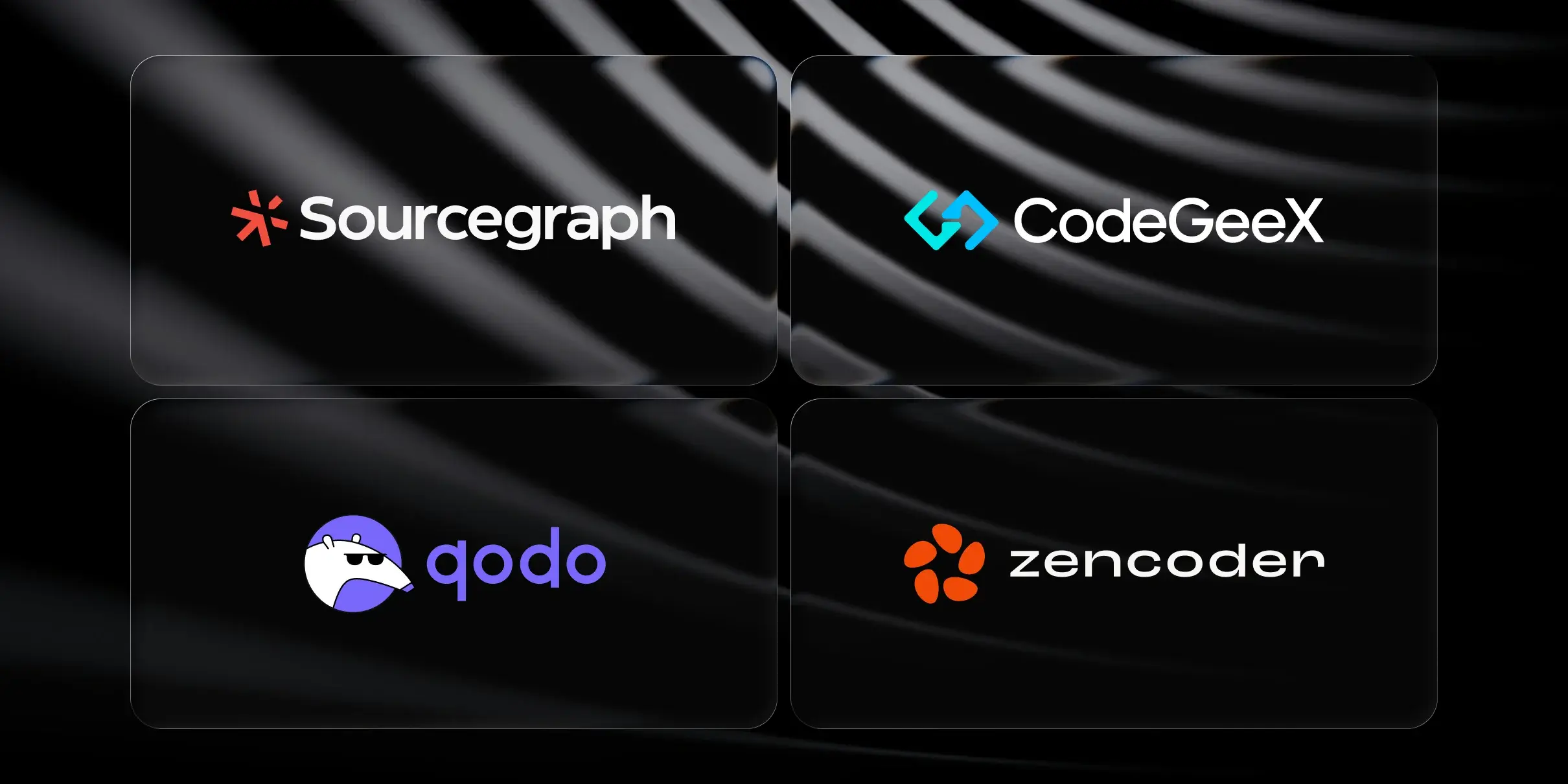Tired of spending hours tweaking margins, fixing breakpoints, and battling with browser inconsistencies? CSS is a core part of modern web design, but it often turns into a frustrating grind of repetitive tweaks and layout headaches. However, with AI advancing at lightning speed, developers now have access to powerful tools that streamline coding, automate design decisions, reduce bugs, and significantly boost overall productivity. In this article, we will explore 7 best AI tools for CSS to help you make an informed decision and simplify the complexities of front-end development. Let’s get started!
7 Best AI Tools for CSS to Try in 2026
1. Zencoder

Zencoder is an AI-powered coding agent that enhances the software development lifecycle (SDLC) by improving productivity, accuracy, and creativity through advanced artificial intelligence solutions. Powered by its advanced Repo Grokking™ technology, Zencoder thoroughly analyzes your entire codebase, identifying structural patterns, architectural logic, and custom implementations. This deep, context-aware understanding enables Zencoder to provide precise recommendations, significantly improving code writing, debugging, and optimization.
Zencoder integrates with your existing development tools and supports over 70 programming languages, including Python, Java, JavaScript, and frontend languages like CSS and HTML. It works effortlessly with popular IDEs like Visual Studio Code and JetBrains. Built with enterprise-grade security at its core, Zencoder adheres to industry-leading standards such as ISO 27001, GDPR, and CCPA, empowering your organization to scale confidently and securely.
Key Features:
1️⃣ Integrations – Zencoder seamlessly integrates with over 20 developer environments, simplifying your entire development lifecycle. It’s the only AI coding agent offering this extensive level of integration.
2️⃣ Coding Agent – Say goodbye to tedious debugging and time-consuming refactoring. Our smart coding assistant helps you move faster and work smarter across multiple files by:
- Quickly spotting and fixing bugs, cleaning up broken code, and smoothly handling tasks across your entire project.
- Automating repetitive or complex workflows to save you time and effort.
- Accelerating full app development so you can focus on the creative, high-impact work that truly matters.

3️⃣ Code Review Agent – Get precise code reviews at any level, whether it's a full file or a single line. Receive clear, actionable feedback to improve code quality, security, and alignment with best practices.
4️⃣ Code Completion – Accelerate your coding with smart, real-time suggestions. Our assistant understands the context to provide accurate, relevant completions that minimize errors and keep your workflow smooth.
5️⃣ Chat Assistant – Receive instant, accurate answers, personalized coding support, and intelligent recommendations to stay productive and keep your workflow smooth.
6️⃣ Zen Agents – Bring the power of Zencoder’s intelligence to your entire organization.
Zen Agents are customizable AI teammates that understand your code, integrate with your tools, and are ready to launch in seconds.

Here is what you can do:
- Build smarter – Create specialized agents for tasks like pull request reviews, testing, or refactoring, tailored to your architecture and frameworks.
- Integrate quickly – Connect to tools like Jira, GitHub, and Stripe in minutes with our no-code MCP interface, letting agents operate seamlessly within your existing workflows.
- Deploy instantly – Deploy agents across your organization with one click, with auto-updates and shared access to keep teams aligned and expertise scalable.
- Explore marketplace – Discover a growing library of open-source, pre-built agents ready to drop into your workflow. See what other developers are building, or contribute your own to help the community move faster.
7️⃣ Code Generation – Speed up development with clean, context-aware code automatically generated and inserted into your project. Ensure consistency, improve efficiency, and move faster with production-ready output.
8️⃣ Zentester – Zentester uses AI to automate testing at every level, so your team can catch bugs early and ship high-quality code faster. Just describe what you want to test in plain English, and Zentester takes care of the rest, adapting as your code evolves.
Here is what it does:
- Our intelligent agents understand your app and interact naturally across the UI, API, and database layers.
- As your code changes, Zentester automatically updates your tests, eliminating the need for constant rewriting.
- From individual unit functions to full end-to-end user flows, every layer of your app is thoroughly tested at scale.
- Zentester’s AI identifies risky code paths, uncovers hidden edge cases, and generates tests based on how real users interact with your app.
9️⃣ Security treble – Zencoder is the only AI coding agent with SOC 2 Type II, ISO 27001 & ISO 42001 certification.

Pros and Cons:
🟢 Pros:
- Uses advanced Repo Grokking™ technology to provide deep, context-aware code analysis and smart recommendations.
- Improves team productivity with customizable Zen Agents that plug in instantly and handle key development tasks automatically.
- Supports 70+ programming languages and 20+ environments, making integration easy, secure, and scalable.
🔴 Cons:
- May lead to over-reliance on automation, potentially limiting long-term skill growth.
Pricing
Zencoder offers a Free Plan, a Starter Plan (free for 7 days) that starts at $19 per user/month, a Core Plan starting at $49 per user/month, and an Advanced Plan starting at $119 per user/month.

2. TeleportHQ

TeleportHQ is a collaborative front-end development platform that combines a powerful visual builder with AI-enhanced tools and headless CMS integrations to streamline website creation. It enables designers and developers to build static and dynamic websites visually, convert Figma designs to code, and deploy projects instantly. With features like reusable component libraries, real-time collaboration, and publishing through platforms like Vercel and GitHub, TeleportHQ accelerates the entire front-end workflow from concept to production.
Key Features:
1️⃣ Free code export – Instantly export clean, production-ready HTML, CSS, and JavaScript for free, with support for five major JS frameworks.
2️⃣ Real-time collaboration – Work together with your team in real time – developers can code side by side while content creators make live edits.
3️⃣ Visual editor – Design websites and apps easily with a visual editor that lets you build without writing any code.
4️⃣ Drag-and-drop interface – Quickly create layouts using a simple drag-and-drop tool that automatically generates clean HTML and CSS.
Pros and Cons:
🟢 Pros:
- Fast AI-powered site and code generation.
- Smooth Figma integration and real-time collaboration.
- Clean, production-ready code export.
🔴 Cons:
- Steep learning curve for beginners.
- Limited templates and customization.
- Smaller, less active community.
Pricing
TeleportHQ offers a Free Plan, a Professional Plan starting at $18 per month, and an Agency Plan with custom pricing.

3. ChatGPT

ChatGPT is an advanced AI language model developed by OpenAI that understands and generates human-like text with high accuracy. It supports you by offering code suggestions, resolving syntax or logic issues, and explaining technical concepts in plain language. For CSS development, ChatGPT enhances productivity by quickly generating responsive styles, assisting with layout troubleshooting, and ensuring best practices are followed throughout the design process.
Key Features:
1️⃣ CSS code generation – Quickly produces layout and style boilerplate, reducing repetitive work and accelerating interface development.
2️⃣ Error identification and fixes – Analyzes CSS snippets and returns targeted solutions, streamlining the debugging process.
3️⃣ Responsive design assistance – Suggests clean, best-practice code for layouts, animations, and visual refinements across devices.
4️⃣ High-precision output – Leverages the latest model improvements to deliver accurate, standards-compliant CSS for complex styling needs.
Pros and Cons:
🟢 Pros:
- Quickly creates responsive layouts and components.
- Suggests modern CSS techniques (e.g. Flexbox, Grid).
- Explains styling concepts clearly.
🔴 Cons:
- Ignores design systems or code conventions.
- Sometimes generates invalid or outdated CSS.
- Lacks visual/design intuition for polish.
Pricing
ChatGPT offers a Free Plan and 2 Paid Plans starting at $20 per month.

4. Claude AI

Claude AI, developed by Anthropic, is an advanced language model designed for natural language understanding and coding assistance. It offers strong capabilities in writing, debugging, and optimizing CSS by interpreting design requirements and generating clean, responsive code. Claude is particularly effective for front-end development workflows, making it a valuable tool for improving productivity and code quality in modern web design.
Key Features:
1️⃣ CSS assistance on request – Claude can help generate responsive CSS, suggest improvements, or refactor styles based on user input.
2️⃣ Context-aware code comprehension – Analyzes and works with extended portions of code, making it easier to maintain consistency across larger projects.
3️⃣ Modern CSS syntax support –Generates CSS that includes features like animations, gradients, pseudo-elements, and media queries when prompted.
4️⃣ Natural language to code – You can describe design goals or layout needs in plain language, and Claude can convert them into corresponding CSS snippets.
Pros and Cons:
🟢 Pros:
- Generates clean, responsive CSS boilerplates quickly.
- Handles multi-step styling tasks with strong context retention.
- Great at debugging and refactoring CSS logic.
🔴 Cons:
- Can produce overly verbose or cautious CSS.
- Needs precise prompts and manual review.
- Less creative than other AI models for visual design.
Pricing
Claude AI offers a Free Plan and 2 Paid Plans starting at $17 per month.

5. Pinegrow Web Editor

Pinegrow Web Editor is a powerful visual and code-based web development tool that offers live styling with CSS, SASS, and LESS through intuitive visual controls and direct code editing. Its built-in AI Assistant streamlines CSS tasks like styling suggestions, layout adjustments, and Tailwind class management, significantly boosting productivity. With various features and seamless integration with frameworks such as Bootstrap and Tailwind CSS, Pinegrow fits naturally into your web development workflows without adding abstraction to your code.
Key Features:
1️⃣ Code + Visual Sync – Integrates code editing with visual tools, allowing real-time updates and reducing context switching during development.
2️⃣ Framework Integration – Provides built-in support for Bootstrap, Foundation, and Tailwind, turning classes into visual controls for faster and cleaner UI development.
3️⃣ Reusable Components – Enables creation of editable, reusable components and master pages, promoting modular development and reducing duplication.
4️⃣ Live CSS Editing – Modify CSS, SASS, and LESS in real time directly within the editor, eliminating the need for external compilers and streamlining the styling process.
Pros and Cons:
🟢 Pros:
- Robust visual editor with direct code integration.
- Strong support for modern frameworks and responsive design.
- Offline functionality with clean export options.
🔴 Cons:
- Steeper learning curve for new users.
- Lacks live content preview capabilities.
- Limited third-party ecosystem and community support.
Pricing
Pinegrow allows you to create your pricing plan, with the lowest plan starting at €10.67 per month.

6. GitHub Copilot

GitHub Copilot is an AI-powered coding assistant that integrates with popular development environments, including Visual Studio Code, JetBrains IDEs, and GitHub itself, to streamline the software development process. It assists with tasks like code completion, debugging, code review, and automated pull requests through features such as Agent Mode. GitHub Copilot supports various programming languages, enabling you to work more efficiently across front-end and back-end projects.
Key Features:
1️⃣ Automated code review – Analyzes your code to uncover bugs and fix mistakes before human review.
2️⃣ Agent mode – Proposes edits, runs tests, and validates changes across multiple files to help implement large-scale modifications.
3️⃣ Next edit suggestions – Shows the impact of your changes across the project to maintain consistency.
4️⃣ Copilot spaces – Combines code, documentation, and notes in one place, enabling the AI to deliver more context-aware and accurate assistance.
Pros and Cons:
🟢 Pros:
- Speeds up writing repetitive styles and layouts.
- Auto-suggests common patterns like flexbox or grid.
- Helpful with vendor prefixes and tricky syntax.
🔴 Cons:
- May generate bloated or non-semantic CSS.
- Sometimes suggests outdated or non-standard rules.
- Lacks full understanding of design context or UX intent.
Pricing
GitHub Copilot offers a Free Plan and 2 Paid Plans starting at $10 per month for individuals.

For businesses, GitHub Copilot offers 2 Paid Plans starting at $19 per month.

7. Sourcegraph Cody

Sourcegraph Cody is an AI code assistant that accelerates development by combining intelligent chat, code completions, and in-line edits using whole-codebase context and the latest large language models. It integrates seamlessly with major IDEs like VS Code, IntelliJ, and WebStorm, supporting various programming languages and technologies, including front-end tools such as CSS. Designed for teams, Cody helps ensure consistency, quality, and speed across large and complex codebases.
Key Features:
1️⃣ Auto-edit – Provides real-time autocomplete suggestions based on your coding history, improving accuracy and development speed.
2️⃣ Agentic chat – Gathers and refines context to deliver precise responses, streamlining communication and task execution.
3️⃣ In-line edits – Allows you to fix, edit, and refactor code directly within your editor, reducing context switching and boosting efficiency.
4️⃣ Context beyond code – Integrates with tools like Notion and Linear to pull in relevant non-code information, enhancing AI understanding and collaboration.
Pros and Cons:
🟢 Pros:
- Handles complex, large-scale codebases effectively.
- Seamless IDE integration with helpful in-line editing features.
- Useful for code refactoring, idea generation, and problem-solving.
🔴 Cons:
- Response times can occasionally lag.
- Suggested code may not always be correct.
- May occasionally miss or forget the surrounding context.
Pricing
Sourcegraph Cody offers a Free Plan and 2 Paid Plans starting at $19 per month.

To Wrap Things Up
Now that you're familiar with the 7 best AI tools for CSS, it's time to find the one that fits your front-end development needs. If your focus is on rapid prototyping and visual collaboration, tools like TeleportHQ or Pinegrow offer intuitive design-to-code workflows. For AI-powered coding support with deep integration and smart debugging, GitHub Copilot, Claude AI, and ChatGPT are strong fits. However, if you are looking for an all-in-one solution that combines intelligent code generation, automated testing, seamless team integration, and enterprise-grade security, Zencoder stands out as the ultimate choice!
Sign up today to discover how our powerful AI features can transform your CSS and front-end development workflow!

![Spec-Driven Development: Everything You Need to Know [2026]](https://zencoder.ai/hubfs/Cover-Feb-17-2026-08-47-58-1236-PM.webp)

